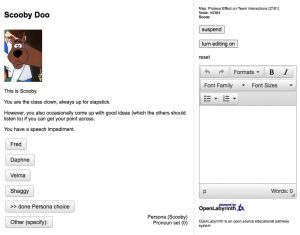We are committed to supporting the principles of Equity, Diversity and Inclusion (EDI) in our OLab platform. We encourage our scenario authors to consider these principles when they create their learning designs and content.

As noted in the Universities Canada statement on EDI, these principles are wide ranging in their effects. There is also a requirement for USA government public-facing resources to be Section 508 compliant, which addresses some similar issues, albeit more at a technical level.
There are a number of ways in which we have made our OLab platforms more supportive of EDI:
- Internationalization — content can be created in a wide range of languages. See our Chilean project for more work on this. Right-to-left languages and multibyte character sets can be supported on our content pages.
- Variable pronoun support: using Constants, Counters and Elements in OLab affords authors with the ability to quickly and flexibly alter the preferred pronouns and genders used in case descriptions. See our case: Genned up on Gender.
- Text-to-speech and speech-to-text: our experiments with such tools have shown that case content display, and data input to services such as TTalk, can accommodate such functional extensions without having to significantly alter the case content material.
- Media that is contained within case materials can be annotated with metadata that supports alternate presentations of materials e.g. for those who may be visually challenged.
- Responsive design within our UX frameworks affords scalable representation of materials that can be used on a wide variety of screen sizes, font sizes and mobile devices.
It is of course important that project leaders also encourage content authors to make use of these capabilities where appropriate. There is not automatic application of such metadata to the material that is created.

Some of our project groups have used OLab to create content around issues that relate to EDI. For example, in our case on Cultural Competencies, the authors made use of virtual learners to explore some of these challenges.
Another important concept that OLab supports in its learning design is the use of the Proteus Effect. First described by Yee and Bailenson at Stanford[1], this is the curious effect that is noted when you place a participant into a role that is not consistent with their usual style of communication. By placing a big dominant alpha male into a persona that is meek, reticent and submissive during an interaction, their natural communication style adopts some elements of the imposed persona. They become less dominant. The reverse is also true. And interestingly, the effect persists beyond the time of the learning session.

To see more about how can use the Proteus Effect in our learning designs, see this example page.
[1]. Yee, N., & Bailenson, J. (2007). The proteus effect: The effect of transformed self-representation on behavior. Human Communication Research, 33(3), 271–290. https://doi.org/10.1111/j.1468-2958.2007.00299.x

